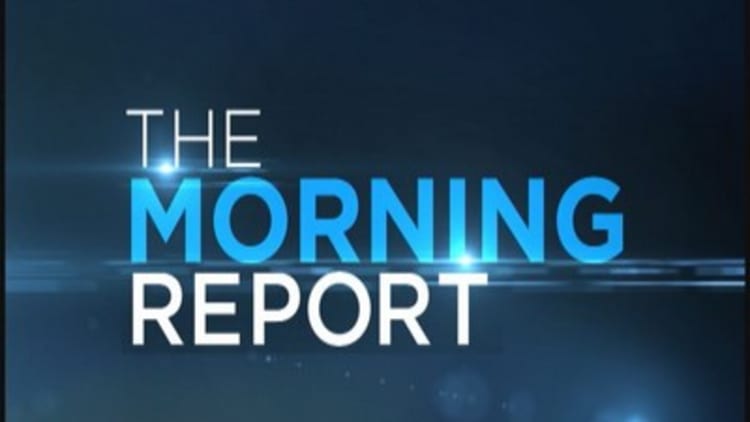
Markets will hone in on October consumer inflation Thursday, a report that's expected to show a decline in inflation because of falling gasoline prices.
The consumer price index has become more interesting after Wednesday's Fed minutes left strategists divided on whether the Fed was dismissing or playing up weak inflation as an issue. The minutes appeared to confirm that Fed members believe the downward trend is temporary, impacted by commodity prices and most members also expect inflation to move back to the Fed's 2 percent target over the medium term.
Economists expect to see a decline in headline CPI of 0.1 percent, but when energy and food are removed, they expect the core CPI to be up 0.1 percent, according to Reuters.
Since the Fed meeting in October, the University of Michigan Consumer Sentiment survey showed a slight decline in longer term inflation expectations. The five-year measure fell to 2.6 percent, the lowest since during the financial crisis in March, 2009.
"The thing that struck me was the inflation expectations since the statement have deteriorated ... that's new information they didn't have in their (October meeting) statement, and the Fed acknowledged it" in the minutes, said CRT Capital Chief Treasury strategist David Ader.
The minutes showed that many Fed officials thought they should be attentive to any shift lower in longer-term inflation expectations, something they believe would be more worrisome if growth slows.
Read MoreFed worried about sub 2 percent inflation
But Ward McCarthy, chief financial economist at Jefferies, said it appears as if the Fed is downplaying inflation. "It's almost like they put it on the back burner. The economy is doing better, but inflation is still nowhere near target so they don't seem incline to address that. I think that's making the market feel confused," he said.
But JPMorgan chief U.S. economist Michael Feroli said in a note that he thought the Fed might highlight its disinflation concerns. He said the Fed's discussion, as noted in the minutes, could lead to an amendment of its statement to add that "downside inflation outcomes are as costly as upside inflation outcomes."
Wednesday's market reaction to the Fed minutes was fairly muted. Stocks moved slightly higher after the 2 p.m. release, then lower. Bond yields fell, then rose again. The Dow ended the day down 2 points at 17,685 and the was off 3 points at 2,048. The 10-year Treasury was yielding 2.34 before the announcement, and was at 2.36 percent later in the day.
Read MoreWhy the Fed might not be aggressive next year
The last time the Fed released minutes from an FOMC meeting, the stock market had its biggest rally of the year. That was because the market heard that a more dovish tone than it had expected after the September meeting.
Strategists said the tone was slightly dovish in the October minutes, but there was no new information that helped guide markets on when the Fed might raise rates.
They said inflation readings will keep getting a lot of attention as traders attempt to handicap when the Fed might raise rates. Any sign of inflation—especially wage inflation—could speed up the rate hike timetable, but if the readings are deflationary that could signal trouble for the economy.
Read More
"I would not be surprised if you got a bigger move on a weaker (CPI) report than a stronger report. The headline should be soft because of energy," said Deutsche Bank chief U.S. economist Joseph LaVorgna. He expects a 0.2 percent increase in core CPI.
Besides CPI on Thursday, there are weekly jobless claims at 8:30 a.m. EST, and leading indicators, existing home sales and the Philadelphia Fed Survey at 10 a.m.
Earnings are expected from Best Buy, The Buckle and Dollar Store ahead of the open. Gap and Intuit report after the closing bell.


